On Tuesday, June 25, the UICA is presenting a one-night-only showing of Richard E. Robbins’ new documentary “Girl Rising.” The film boasts an all-star cast working in collaboration with the filmmakers and the project’s partners to raise awareness about the state of women's and girls’ education around the world.
Using a segmented format, “Girl Rising” depicts nine girls’ experiences with education in their respective countries. Each girl was paired with a writer from her country to help articulate and prepare each story for the film.
With the exception of two, all the narratives are performed by the girls and women in question, while each storyline is narrated by a celebrity cast member.
The circumstances each girl faces are varied and unsurprisingly heart-wrenching. Every single one of them overcame adversity to pursue their education, and the sacrifices they and their families have made are abundantly evident. The result is a film that is likely to give the viewer pause.
Education is a hotly contested issue within American culture. Its political clout seems to become more and more minimal as it is shunted off to the side within the national dialogue. As our national ambivalence toward education develops it is worth remembering that not everyone has access to it. It is also worth articulating how unacceptable that is.
The film also provides a number of sobering statistics.
In today’s world there are 66 million young girls who are unable to attend school. There are 33 million fewer girls than boys in school. The consequences of these figures amount to more than an abstract musing about whether these girls will gain entrance to a good college- their lives depend on it.
When girls don’t have access to education their quality of life decreases. In sub-saharan Africa, 75% of AIDS cases are female. Every year 150,000,000 girls will be sexually assaulted worldwide. And this year 14 million girls under the age of 18 will be married in lieu of seeking an education.
“Girl Rising” serves as a reminder that for many people, especially young girls and young women, attending school isn’t a chore- it’s a privilege. Each girl has a concrete idea regarding how she’ll use her education to improve the world around her. Many of the girls in the film are already working to help provide other girls with the opportunities they had. They’re working to create options where there weren’t any before.
Overall the film is incredibly effective. By pairing each girl with a writer from their country of origin the film worked to alleviate my concern that it would be another narrative of the western savior helping those who cannot help themselves.
Another strength is the film’s lack of melodrama. In fact, as several of the narratives progress it remains chillingly composed. In situations that would reduce myself and anyone I know to a nervous breakdown most of the girls in the film react with shocking stoicism.
The cast includes, among others, Cate Blanchett, Alicia Keys, Kerry Washington, Anne Hathaway, Meryl Streep and Liam Neeson. Each female cast member is assigned a narrative to read, while Neeson acts as a sort of binding agent for the film. After each segment he joins the discussion by dispensing staggering statistics about the importance of educating girls.
Neeson’s presence in the cast is striking if for no reason other than his being the only male voice. It’s striking that the women involved in the film’s narration are responsible for the film’s more emotional element. They collaborate with the girls and the writers to help tell each individual story. Neeson, by contrast, is the film’s lone male voice and is the only voice articulating hard facts. His is the voice that dispenses straightforward information.
As the film progressed I felt a cynical shift as I thought, “Could it be they gave him the facts because the audience is more inclined to accept facts from a male authority figure? Would they possibly do that in a film about the importance of education for young girls?”
In the larger scope of a film articulating something as vital of education on the global scale- a subject no one else seems interested in depicting- I’m willing, bordering on eager, to discard my more cynical doubts. But it’s worth considering as one watches the film.
“Girl Rising” raises vital questions about education on the global scale. It leaves the viewer to contemplate what it means to live on this planet in the year 2013 where there are still millions and millions of people without access to academics. The film ends by offering solutions and options available to the audience, coupled with a reminder of the human spirit’s resilience.
The UICA will offer one showing of “Girl Rising” on Tuesday, June 25 at 8:00 p.m.
The Rapidian, a program of the 501(c)3 nonprofit Community Media Center, relies on the community’s support to help cover the cost of training reporters and publishing content.
We need your help.
If each of our readers and content creators who values this community platform help support its creation and maintenance, The Rapidian can continue to educate and facilitate a conversation around issues for years to come.
Please support The Rapidian and make a contribution today.
